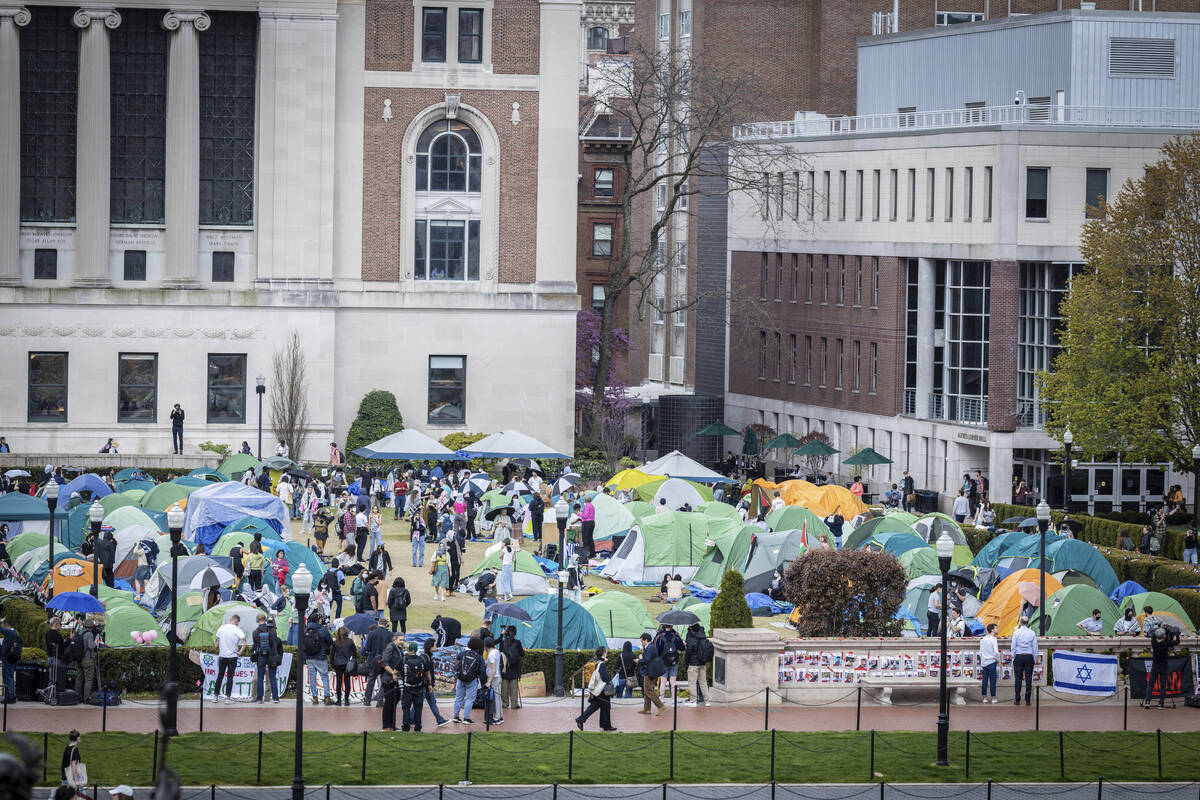As pro-Palestinian protests, with arrests, have spread to colleges across the country in recent days, I have a feeling akin to what Yogi Berra is said to have called “deja vu all over again.”
I’ve seen this rodeo before. We’re a long way from Vietnam and more than a half-century from the military draft that probably galvanized more young war resisters than any other single issue.
By last week, pro-Palestinian protests had expanded to college campuses across the United States. The total number of people detained now has topped 2,000 as officials try mightily to quell the unrest, clear encampments and even close buildings. The University of Southern California canceled the school’s main commencement ceremony scheduled for May 10 following protests there.
Since April 18, police have detained protesters at Emerson College in Boston, New York University, the University of Texas at Austin and Ohio State University, among others. But even as law enforcement has moved in, students — many demanding that their institutions cut ties with corporations doing business with Israel — have gathered on campuses, defying exhortations and threats by administrators and calls for crackdowns by politicians.
In Atlanta, the police department said officers used chemical irritants to clear demonstrators from Emory University. They denied using rubber bullets, as reported in some outlets.
Students are showing little appetite for folding up their tents and signs as the academic year comes to a close. In some places, the police action is drawing recruits to their cause.
Unfortunately, we’re seeing much of the same anger and outrage over the relentless bombing of Gaza and the cruel hostage dramas of Hamas that led to mass arrests and graduation cancellations that some of us old-timers easily and unhappily recall from the Vietnam era.
I am reminded in particular of 1970, a year recalled by my fellow Ohio University alumni as “the year without a graduation ceremony.” Students were sent home early at all of the state’s public universities after a tragic encounter at our sister university, Kent State, between armed Ohio National Guard members and unarmed student protesters. If you’re not old enough to remember that episode, perhaps you at least remember the protest song “Ohio,” written by Neil Young for Crosby, Stills, Nash &Young, with its haunting refrain, “Four dead in Ohio.”
Tin soldiers and Nixon coming
We’re finally on our own
This summer I hear the drumming
Four dead in Ohio.
During that summer I, too, heard the drumming.
I had graduated a year earlier, which ended my student deferment. I was draft bait, lucky enough to be working as a reporter for the Chicago Tribune, when I finally received something that I had dreaded like a subpoena for the previous four years of my life: my draft notice.
After I finished basic training at Fort Dix, New Jersey, I was given orders to report to Fort Lewis, Washington, now part of Joint Base Lewis-McChord, and a signal to me that, in our GI jargon, I was on my way to “‘Nam,” or simply, “the war.”
On my way to the West Coast, I stopped for a couple of days to revisit my alma mater in Athens, Ohio. It was there on the television in the student union that I heard President Richard Nixon announce his latest surprise: America was making an “incursion,” which sounds slightly nicer although less honest, than “invasion,” into Cambodia.
With resentment already building over a war we were told was winding down, this incursion was, for many, the last straw. By the time I exited the front door of the student union, spontaneous street protests were beginning to break out.
Ohio Gov. James Rhodes called out the National Guard, which the university wisely kept on standby in barracks outside of town, perhaps to give the protesters a chance to tire themselves out. Kent State was not that fortunate.
Fast-forward to today, and, as protests have spread, Texas Gov. Greg Abbott may have taken the “prize” for imposing tough measures. After hearing that pro-Palestinian protesters were planning to occupy a lawn on the University of Texas campus, Abbott called in more than 100 state troopers with orders to clear them out.
Texas would not put up with the sort of protester tent city that occupied a lawn on New York’s Columbia University. We’ve come to expect such excesses from Abbott, who famously laid barbed-wire-bearing traps in the Rio Grande to stop undocumented immigrants from slipping into the Lone Star State.
On the flip side, a weeks-long standoff over student tent cities doesn’t seem ideal, either.
We’ve been here before as a country. Let’s hope by the time this tumultuous time draws to a close that we don’t end up with the long-term scars Vietnam left us.
Contact Clarence Page at cpage@chicagotribune.com.

